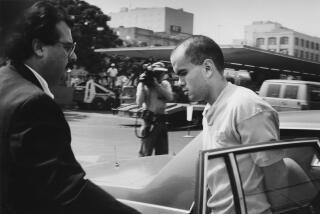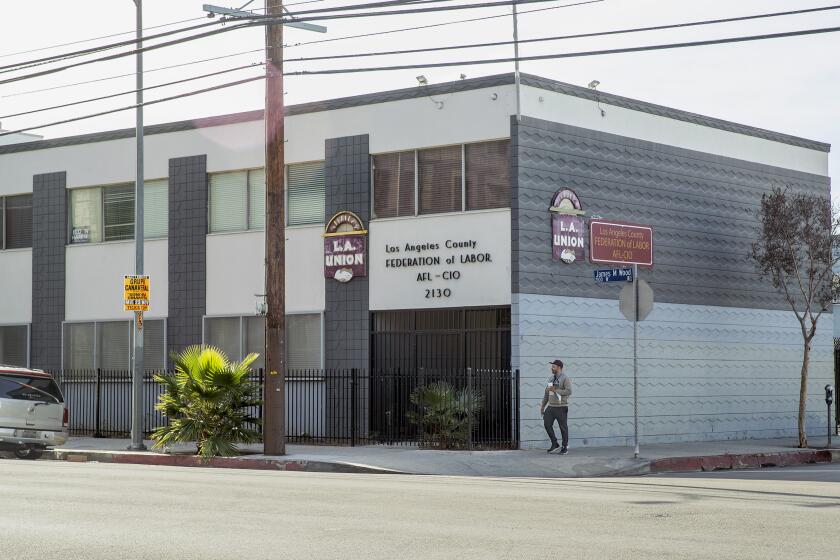City Ballots in Chinese, Spanish Are Approved
Starting in April, Monterey Park will print election materials in Chinese, as well as Spanish and English, a move expected to encourage more Chinese-speaking residents to register to vote.
Monterey Park becomes the second community in California to provide election materials in Chinese; city and county ballots in San Francisco already are translated.
For the record:
12:00 a.m. Dec. 19, 1991 For the Record
Los Angeles Times Thursday December 19, 1991 Home Edition San Gabriel Valley Part J Page 2 Column 2 Zones Desk 2 inches; 43 words Type of Material: Correction
Asian-American Council--A Dec. 12 article reported incorrectly that Monterey Park might become the first U.S. city to have an Asian-American City Council majority. Asian-Americans already constitute a majority on all four county councils in Hawaii, including the Honolulu City and County Council.
The Monterey Park City Council on Monday voted to include Chinese and Spanish translations in election ballots and sample ballots printed by the city with candidates’ statements. Previously, the candidates’ statements were available in Spanish but actual ballots were only in English.
The measure applies only to municipal elections, since the city has no control over ballots for county, state and federal elections.
Limited English skills prevent many naturalized U.S. citizens from registering to vote, said Chinese political activists who lobbied for the measure. Even if they register, Chinese-American residents might be intimidated by pages of text in a language they do not fully understand, the activists said.
Chinese-language ballots could have a decisive impact on the April City Council race. Some political observers believe Chinese-Americans might win both open seats, making Monterey Park the first city in the nation to have an Asian-American council majority.
“This is something that will encourage more participation in the democratic system,” said Mayor Sam Kiang, who proposed the measure.
“In the past few years, we talked about isolation and alienation,” said Francis Hong of Monterey Park, one of the activists. “This is a process through which we can bring (immigrants) into the mainstream of America . . . to bring the old and the new together.”
Thirty-six percent of Monterey Park’s 60,738 residents are Chinese. There are no official current figures on voter registration by ethnic group, but a 1989 study by UCLA professor Don Nakanishi found Chinese-Americans constitute only 23.1% of Monterey Park registered voters.
There are no requirements that cities provide translated election materials. But under a 1982 amendment to the U.S. Voting Rights Act, California counties that had not previously provided translations were required to do so if at least 5% of their voting-age U.S. citizens speak only another language.
Anthony Miller, chief deputy for Secretary of State March Fong Eu, said Los Angeles County was not required to provide Spanish-language ballots because it already did.
Ten counties are required to provide Spanish translation; none is required to translate election materials into Chinese.
Monterey Park already translates statements into Spanish for candidates who agree to pay about $300 each for the extra printing cost.
Under the resolution adopted Monday, candidates could also request Chinese translations, at their expense. No cost estimates were given.
In addition, the city will pay for Chinese and Spanish translations of other election material, including descriptions of local measures in the sample ballot, mail-in ballot applications and official ballots. The cost of those translations is estimated at $5,372 per election, said Beth Fujishige, a city administrative assistant.
Councilwoman Betty Couch cast the lone vote against authorizing the translations. She said she supported the idea but was concerned about hidden costs, such as hiring bilingual employees in the city clerk’s office to answer questions from non-English-speaking voters.
Councilwoman Marie T. Purvis said that although she voted in favor, she would not ask for Chinese or Spanish translations of her own statement if she runs for reelection in 1994. She and former Councilman Barry Hatch declined Spanish statements during the 1990 race.
“When I ran, I asked my (Mexican) friends, ‘Should I do it in Spanish?’ ” Purvis said Tuesday. “They were insulted. They asked me, ‘You think I don’t speak English?’ They were making fun of me for even suggesting it.
“Everyone understands English,” she added. “Some just don’t speak English as well as others. If you’re a good (council member) that’s reaching out more than just putting things on paper. That’s much more important.”
More to Read
Start your day right
Sign up for Essential California for news, features and recommendations from the L.A. Times and beyond in your inbox six days a week.
You may occasionally receive promotional content from the Los Angeles Times.






